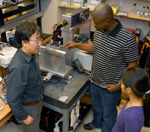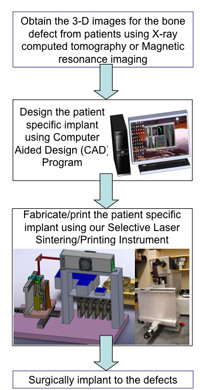|
|
|

|
SPOTLIGHT IN THE LAB
|
MUSC
machine
shop facilities research in regenerative medicine
What
The rapidly developing research focus at MUSC in regenerative medicine,
which offers the potential to make “replacement parts” for the human
body grown from a patient’s own cells. MUSC is fortunate to have a
Research Machine Shop Facility operated under the auspices of the
Office of the Associate Provost for Research, Stephen Lanier, Ph.D., to
assist researchers in building custom equipment needed for cutting edge
research. It also provides the capability for modification and repair
of existing equipment.
The Researcher
 Bioengineering
professor Dr. Xuejun Wen, left, graduate student Van Tran, right, and
machinist Johnny Mole discuss the development of an instrument designed
to do 3D printing of the mineral scaffold for bioengineered bone. Bioengineering
professor Dr. Xuejun Wen, left, graduate student Van Tran, right, and
machinist Johnny Mole discuss the development of an instrument designed
to do 3D printing of the mineral scaffold for bioengineered bone.
Xuejun Wen, M.D., Ph.D., a member of the faculty of the Clemson-MUSC
Bioengineering Program is working to develop the capability to generate
bones. Van Tran, a Ph.D. student working with Wen, is assembling a
custom “three-dimensional printer” using parts made by the machine shop
as well as a variety of other commercially available components.
How it Works
 This
instrument will generate the “mineral scaffold” for growing bones from
bone cells. A computer generated drawing of the required bone shape is
converted to a series of computer instructions for the instrument to
build the scaffold by fusing fine grains of mineral material with a
high powered laser beam focused to a very small area. This project,
typical of the area of bioengineering, weds a series of areas of
engineering, computer science, laser science, mechanics, chemistry, and
biology to produce an instrument to make bones for therapeutic uses. This
instrument will generate the “mineral scaffold” for growing bones from
bone cells. A computer generated drawing of the required bone shape is
converted to a series of computer instructions for the instrument to
build the scaffold by fusing fine grains of mineral material with a
high powered laser beam focused to a very small area. This project,
typical of the area of bioengineering, weds a series of areas of
engineering, computer science, laser science, mechanics, chemistry, and
biology to produce an instrument to make bones for therapeutic uses.
Wen, recently appointed Center of Economic Excellence Endowed Professor
of Bioengineering, said the success of any bioengineering research
program is greatly dependent on the on-campus machining and
microfabrication facility. “We are very fortunate to have a
professional machine shop on our medical school campus.”
Did you know
The Machine Shop Facility provides services in design, construction,
modification, and repair of research equipment. Capabilities include
computer- assisted design, inert gas welding and sheet metal
fabrication.
Constructed in Dan Knapp’s laboratory, the facility can provide laser
micromachining with ability to drill holes down to 10 microns.
Researchers with machine shop needs may contact Johnny Mole, machinist
(792-9077, molejj@ musc.edu) or Knapp, Ph.D. (792-5830,
knappdr@musc.edu).
Friday, Dec. 10, 2010
|
|
|




 This
instrument will generate the “mineral scaffold” for growing bones from
bone cells. A computer generated drawing of the required bone shape is
converted to a series of computer instructions for the instrument to
build the scaffold by fusing fine grains of mineral material with a
high powered laser beam focused to a very small area. This project,
typical of the area of bioengineering, weds a series of areas of
engineering, computer science, laser science, mechanics, chemistry, and
biology to produce an instrument to make bones for therapeutic uses.
This
instrument will generate the “mineral scaffold” for growing bones from
bone cells. A computer generated drawing of the required bone shape is
converted to a series of computer instructions for the instrument to
build the scaffold by fusing fine grains of mineral material with a
high powered laser beam focused to a very small area. This project,
typical of the area of bioengineering, weds a series of areas of
engineering, computer science, laser science, mechanics, chemistry, and
biology to produce an instrument to make bones for therapeutic uses.